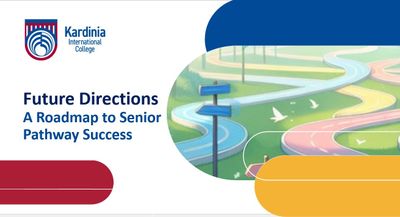Semester 2 2025 Course Selection
Below you will find relevant information for 2025 Course Selection
Below you will find relevant information for 2025 Course Selection

Selecting your course for Semester 2, 2025
It is time to start thinking about your subjects for Semester 2, 2025. The upcoming Parent Teacher Interviews are an opportunity for you to start talking with your parents and teachers about subjects for next semester
Step 1 - Reflection - Use the questions below to reflect on your strengths and areas for improvement
1. What have been my major achievements over the last two semesters?
2. What areas of my learning have I experienced difficulty or challenges in?
3. What preparations do I need to get ready for studies I want to take in the future?
Step 2 - Click on the Course Map below to download

Step 3 - Consider the minimum unit requirements

Step 4 - Make sure you have included the Compulsory Health and PE Units

Year 7 & 8

Year 9


Year 10


Future Directions Parent Information Evening Monday February 24th
Click on the thumbnail below to access a video of the Parent Information Evening.

Doing a VCE or VET Subject in Year 10
When Year 8 and Year 9 students are selecting units for Semester 2, the usual curriculum protocols apply. However, students should be aware that it is possible to include a VCE or VET (unit one/two) subject, when undertaking Year 10 in the future.
If a student is managing all areas of his/her Year 9 course, has good time management skills and has performed well in one or more areas of the curriculum, taking a VCE unit early is a sensible option which may provide several advantages:
Considerations:
Future Directions Booklet: Future Directions Bridges

Frequently Asked Questions
FAQs regarding acceleration into VCE
What D and E level subjects should I undertake in Semester 2 of Year 9?
Click on the document below to see a list of recommended preparation units

What are D and E level teachers looking for in an accelerated student?
Teachers are looking for students who have demonstrated good grades (at least B+), excellent learning behaviours, excellent attendance, and have an excellent work ethic.
How can I accelerate into VCE?
Students should have completed the D or E level subject relevant to that subject area. You should be getting good grades of at least a B+ in that subject area also. Your teacher can give a recommendation for acceleration for one subject.
Do I have to accelerate into VCE in Year 10?
No. Whilst acceleration in one area is encouraged, it is not always in the best interests of the student to do so. Sometimes, students will be better to consolidate their knowledge at D or E level to prepare them for entry into VCE the year after.
Will my application be approved?
Teachers and leaders consider many factors when considering applications to accelerate. Approval to accelerate is not automatic. Students will be advised on pathways best suited to their learning and preparation for VCE.
Can I do two accelerated subjects?
Only in a small number of cases will students be approved to do two accelerated subjects. The student’s whole program is considered in these instances. Attendance, learning behaviours, academic and application awards, academic performance and overall wellbeing are just some of the considerations. Students must have completed the D or E level preparation units. Students may be advised to complete an alternative D or E level to better prepare them for VCE.
Can I skip Units 1 and 2 and go straight into Units 3 and 4 as acceleration?
It is not considered best preparation to skip Units 1 and 2. Special approval would be required.
If I accelerate and complete a Unit 3-4 early, can I do less subjects later?
Year 12 students are expected to complete 5 Unit 3-4 subjects whilst in year 12. A Unit 3-4 subject completed in Year 11 will count as a student’s 6th subject contributing to the VCE certificate and ATAR.
Students who have completed 2 or more VCE Unit 3-4 subjects early will be expected to still complete at least 4 or 5 subjects in Year 12. These students may consider acceleration into University programs such as Deakin Accelerate.
Can VCE subjects contribute to IB?
No. Some Unit 1-2 subjects help to better prepare students for the IB programme, however these will not contribute any credit towards their diploma. If you are thinking about IB, some subjects are preferred over others. It is important to discuss this with the VCE or IB Coordinator.
Do I get a bonus 10% for doing an early VCE subject?
No. There is no bonus for doing a subject early. The ATAR is a rank based on each student’s aggregate (or total) produced by adding:
The VTAC scaled study score in one of English, English Language, Literature or English as an Additional Language (EAL)
Completing a unit 3 and 4 sequence in Year 11 allows students to include a sixth subject in their ATAR calculation while only having to complete five sequences in Year 12. The 10% “bonus” comes from having a sixth sequence, not from doing the sequence early.
Can I begin acceleration mid year into Unit 2 without doing Unit 1?
There is no mid-year intake for acceleration at Year 10 even if they have completed the D or E level subject.
| VCE Coordinator | IB Coordinator | VET Coordinator |
|---|---|---|
|
Ms Brooke Arnold
|
Ms Ainslie Howard
|
Mr Paul Wigglesworth
|
| Head of Future Pathways Education |
|---|
|
Ms Kloe Woods
|